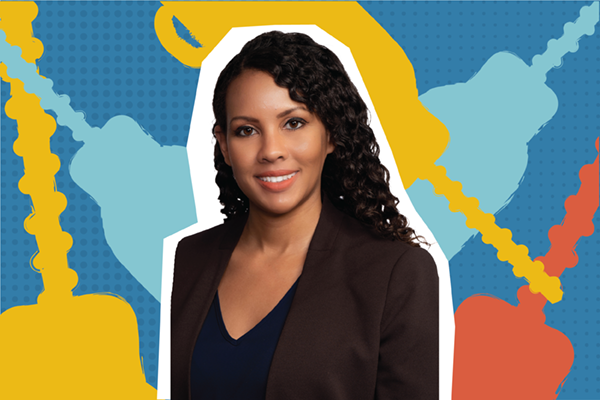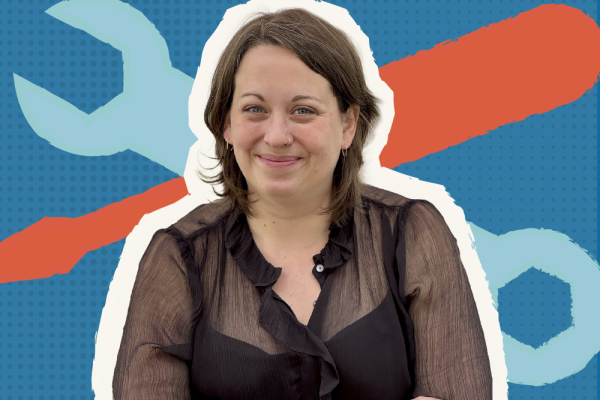This interview is part of The Reconstruct, a weekly newsletter from Sojourners. In a world where so much needs to change, Mitchell Atencio and Josiah R. Daniels interview people who have faith in a new future and are working toward repair. Subscribe here.
When you were a kid and first learned that if you ever found a genie, they’d grant you three wishes, my guess is that you immediately thought about asking for unlimited wishes. Of course, one stipulation that a genie gives — at least in the Disney cartoon Aladdin — is that you cannot wish for unlimited wishes.
In this week’s conversation with writer and novelist Alessandra Harris, we spoke about her love of writing and when she first realized she wanted to be a writer. She was in fourth grade and the story she had written about a genie was chosen by her teacher to receive a prize. When you’re a kid, there’s just something extremely compelling about the fantasy of encountering a genie who will grant you wishes galore. Of course, as a kid, our wishes are rather innocent and self-centered: “I wish I could meet Michael Jordan,” “I wish the Chicago Bulls could win one more championship,” and, last but not least, “I wish for more wishes.” As you grow up, you realize genies aren’t real but that doesn’t prevent you from imagining what you’d wish for if you had three, two, or even a single wish. And as we age, our wishes tend to transform into a single hope for something innocent and unselfish.
The dedication to Harris’ new book, In the Shadow of Freedom, exemplifies such a hope: “For America, that you may one day be the land of the free.” Harris’ book is a well-researched, well-argued analysis of the ways in which Black people continue to experience unfreedom in the United States. Harris, who is a Black Catholic, utilizes Catholic social teaching as well as sociology and the Black radical corpus to critique what she calls “neoslavery,” and to imagine an alternative world.
Because of the interdisciplinary nature of the book and because Harris is a dynamic writer who has published both fiction and nonfiction works, In the Shadow of Freedom will have broad appeal to all audiences. I sat down with Harris to discuss her book, her faith, and what it means to wish for an America where Black people — and all people — are truly free.
This interview has been edited for length and clarity.
Josiah R. Daniels, Sojourners: Tell me about your book In the Shadow of Freedom.
Alessandra Harris: I’m actually happy that I did name the book because with one of my novels, I didn’t, and I didn’t like the name that much. [With this title,] I was trying to convey that African Americans — not all, but still a large segment — are not truly free in the United States.
Neither my children nor my husband is incarcerated, but it’s an ever-present threat that it could happen, or police violence could happen. One of my kids had to transfer schools because of the racism that he experienced.
The dedication was for America, that “you may one day be the land of the free,” and we’re not there right now. I’ve been asked before: Do you think that you’ll see the end of racism — anti-Black racism — in your lifetime? As of right now, my answer is no.
But that doesn’t stop you from pushing for the end of racism, right? That’s one of the big points of the book, yes?
Yes. For a lot of people, they’re still thinking we’re in this post-racial America, and we’re not. I hope the book will be read by everyone, [not just Catholics.] I do draw on Catholic teaching and Pope Francis because I wanted it to resonate with Catholic audiences that aren’t having these types of conversations.
You’ve written a number of novels, and this is your first nonfiction book. What was that transition like from fiction to nonfiction?
It was hard in a sense. In 2020, I was part of a group of Black Catholics that cofounded [the news site] Black Catholic Messenger. After that, I had the opportunity to write for several other Catholic publications, and last year, The Revealer. So, I was doing some nonfiction and some essays.
In 2021, I wrote an essay for America magazine that covered some of these topics about mass incarceration. But I didn’t feel I necessarily could write a whole book, a nonfiction book. After I wrote that [essay], I just kept feeling the prompting that I needed to do more. So that’s when I said, “OK, I’m gonna try. I’m gonna just try to do it.”
Tell me a little bit about Black Catholic Messenger. How did it get started and how did you get involved?
Nate Tinner-Williams reached out to Black Catholic writers specifically with this idea of starting our own news media site geared toward the Black Catholic population. If you look at mainstream Catholic media, I say it’s gotten a little bit better with some publications like National Catholic Reporter. But in general, you wouldn’t think Black Catholics existed. There’s 3 million of us [in the U.S.]
I had the opportunity to write until 2020 when I stepped down, but I’m still very close to the publication and support their mission.
I would really credit that with getting my foot in the door of Catholic media. Writing those essays allowed me, when I pitched to other publications, to get accepted and other publications would reach out to me about writing for them. I feel like that launched my professional freelance writing career in Catholic media.
What are some of the conversations happening right now in the Catholic Church about racism?
The Catholic Church has been going through a synodal process, and I know that there was an African American woman [Cynthia Bailey Manns] who was one of the people who went as a delegate. Before she went, there was a listening session with other Black Catholics to talk about our concerns that we’d like her to take with her when she went to Rome.
A lot of Black Catholics are still struggling with racism in their parishes, and they’re struggling [to gain] funding and resources to do what they feel called to do in their churches. We’re also struggling with church closures, church mergers, and historically Black Catholic parishes and schools closing.
And Nate Tinner-Williams from Black Catholic Messenger has done a really good job documenting how many Black Catholic schools and parishes are closing, because outside of that, you don’t hear a conversation about it.
Did you grow up Catholic? Did you convert later in life?
I like to say that I’m a cradle Catholic, but I technically received baptism, first communion, and confirmation all at the same time in first grade because my mom also is a cradle Catholic.
She is from South Africa and my dad does not prescribe to a religion. I think he considers himself agnostic. So, there was a little bit of tension about my sister and I being baptized, but he finally allowed it. [We both] got all of the sacraments at the same time.
So, your dad, he’d always been agnostic?
He tells a story when he was, I think around 10 or 11, and he had his Bible and his mom had told him to go to church. He was excited to go. My dad is African American, but he went to a church that was mostly white people and the pastor was just spewing racism. He left the church and has never wanted to go back. He said it was such a bad experience. It turned him off from religion.
Your book talks about the need to foster dialogue that will spur people into action. How do conversations in the United States need to be reframed for that to happen?
2020 made me realize that Americans who aren’t Black have the capacity to care about anti-Black racism. I remember there was a period during 2020 when there were, like, corporations saying they supported Black lives. It felt like I was in a parallel universe.
But having people not go back to being complacent is the challenge. When you talk about something like mass incarceration, it’s extremely hard to get people to care about it. What I was hoping to do with my book was to unpeel the layers of what happened and how we got to where we are now. I don’t think most people think about people who are stuck in cages right now.
I was hoping to start a conversation to say, “Hey, if you thought slavery was wrong, if you thought American apartheid in the form of Jim Crow segregation was wrong, then you should actually start caring about what’s happening in our country right now.”
What do you do with a situation like Amazon where, during the Black Lives Matter racial justice uprisings of 2020, they had come out in support of Black Lives, but we know that they’re deeply invested in exploiting workers in warehouses, many of whom are Black people. How do we keep the conversation going in our culture about Black lives mattering while also being able to point out situations where there are contradictions?
For a lot of the corporations who did say that Black Lives Matter, that was a moment in time for them. Even for a lot of people who supported the Black Lives Matter movement at that time, that was probably a moment for them too, and it’s passed.
Now we’re seeing such a fierce backlash to 2020. Nikole Hannah-Jones’s The 1619 Project docuseries had a segment about Amazon. She was talking about some of the warehouses that were trying to unionize. She was talking about the structure, about how there are almost no Black people in [management positions] in Amazon, and how it is completely exploitative. The way I would connect that to my book is when I talk about racial capitalism. I talk about what preceded mass incarceration: the deindustrialization and de-unionization of jobs that were supporting Black men in the workforce and Black families.
There has never really been a time when African Americans as a whole have had gainful employment in the country. You had slavery when we weren’t paid anything, and then you had a period of time when the unions would not accept Black members. And you had a time when Black people could only really be employed as janitors or servants or agricultural [workers]. I try to talk about how that has led to racism in the workforce and to where we are today with mass incarceration; [it’s led to] the racial wealth gap with underfunded neighborhoods and schools in predominantly Black areas. It’s all connected to me.
When you see a Black person being killed by a police officer, that’s the tip of the iceberg. There’s so much underneath.
Have you been able to get some folks to see things differently when presenting them with the facts about the history of the United States and its relationship to its Black citizens?
I wrote an essay for Black Catholic Messenger that The Catholic Worker also ran in their newspaper, and then I got a physical letter from a white gentleman. I think he said he was in his 80s and lives in a neighborhood that has a lot of drug use and is low-income and he was trying to say, “You should read the Moynihan Report, because, the reason this is happening right now is because of the breakdown of the Black family.”
What I thought was really interesting is the out-of-wedlock birth rate started to soar in 1980 when the prison boom was taking off — starting in ’73 — with a steep climb up until 2009, and then it started leveling off.
We don’t look at this huge thing about all these Black men who are being locked up in prison.
I think the Moynihan Report is deeply embedded in the psyche of American people generally, but I think specifically white Americans. I’d first heard about it from Ta-Nehisi Coates. I think that the ways that we think about the Black experience in the United States are just so reliant on these tropes.
I want to ask a question about Pope Francis. One of the things Francis talks about is how people who are born in this country but are treated like foreigners are “existential foreigners.” In what way do you think that language is helpful?
I would absolutely say that as an African American, I often feel like an existential foreigner in the sense that — and I know there’s a different conversation around this — but when you are a hyphenated American, you’re always going to be treated differently, like you’re not fully American.
I like to refer to myself as African American or Black because I’m proud of that title. But I also think that it can create that distance that you’re not a true American. A lot of the backlash to the 1619 Project was because Hannah-Jones was trying to place African American people in the center of the narrative, not as existential foreigners who aren’t really important to the American story.
I talk a little bit about lynching in the second chapter, and I think it was Richard Wright who said that he had never been lynched, but he felt like he had been lynched a thousand times. Part of lynching was to put fear in the Black community that it could be you. And I think that still happens now for African Americans like me. It’s the fear that we could be stopped [by police] at any time because we’re Black.
My husband and I went to pick up our kids from a friend’s house. He waited in the car and I went in the house and was talking a little bit. When we were getting ready to come out, we saw the police behind my husband’s car questioning him. He did absolutely nothing except park his car on a public street.
What’s something that you do in order to give yourself hope?
That was actually my prayer for 2024. It wasn’t a resolution because I didn’t feel like I could do it myself, but I felt like it was a prayer that I wanted to cultivate hope this year. Because, especially after writing this book and especially after dealing with the racism my son experienced at his high school, I feel like my hope is depleted right now.
So I know you wanted to go on to a lighter subject, but that’s my prayer that I can cultivate a sense of hope.
Just when you turn on the news or you look at social media and you see so many Palestinians losing everything, I just feel like that’s happening at the same time that we’re having this interview. That’s really heavy, and it’s hard to feel hopeful.
Got something to say about what you're reading? We value your feedback!







